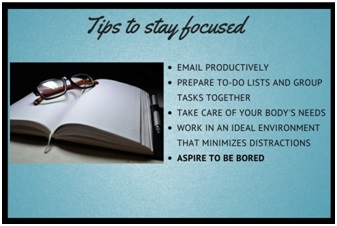By: Huri Mücahit Edited by: Paulina Krzyszczyk
The following blog post is a summary of the articles, “Turn off your email and social media to get more done" by John Tregoning and “15 ways to stay focused all day” by Jessica Orwig and Lydia Ramsey With the advent  of smartphones, our ability to access information has dramatically increased. Our productivity and capabilities have quickly followed, such that, we can remain up-to-date on all news, emails, and activities within our professional and social networks. However, does this constant accessibility come at a cost? According to several experts, the answer is a resounding, yes!, and the cost is much greater than any of us have anticipated. The state of “hyper-connectedness” is so time-consuming that our efforts at productivity are often undermined by the myriad of distractions available to us. Attempts at focusing on papers, experimental time points, and any of the other number of tasks graduate students must focus on can be thwarted with message notifications and work emails, demanding our immediate attention and leaving very little of our ability to concentrate. How can we then combat these distractions to reach our desired level of productivity and eventually reach the finish line? The answer, according to John Tregoning, is not to work harder, but to work smarter. Listed below are several tips and suggestions provided by Tregoning, Jessica Orwig, and Lydia Ramsey.
of smartphones, our ability to access information has dramatically increased. Our productivity and capabilities have quickly followed, such that, we can remain up-to-date on all news, emails, and activities within our professional and social networks. However, does this constant accessibility come at a cost? According to several experts, the answer is a resounding, yes!, and the cost is much greater than any of us have anticipated. The state of “hyper-connectedness” is so time-consuming that our efforts at productivity are often undermined by the myriad of distractions available to us. Attempts at focusing on papers, experimental time points, and any of the other number of tasks graduate students must focus on can be thwarted with message notifications and work emails, demanding our immediate attention and leaving very little of our ability to concentrate. How can we then combat these distractions to reach our desired level of productivity and eventually reach the finish line? The answer, according to John Tregoning, is not to work harder, but to work smarter. Listed below are several tips and suggestions provided by Tregoning, Jessica Orwig, and Lydia Ramsey.
- Email productively
- Given the role emails play within our work environments, it is impossible to disregard them completely. However, to ensure that it does not take away crucial time from other tasks, it is best to limit email time to specific bursts. All answered emails should also be kept concise and to-the-point to avoid the dreaded chains and “volley” of emails back and forth.
- Flag emails that don’t require immediate attention and set them aside for later, to be completed during less productive times.
- Establish a to-do list and group non-essential tasks together to minimize distractions
- Any thoughts that demand your attention can be jotted down for later, which can help drastically when planning experiments!
- Multi-tasking may appear to increase efficiency, but it is often counter-productive.Our focus is a finite resource, and dividing it between multiple tasks results in a lower ability to focus on important tasks.
- Additionally, allotting specific work hours can help train your brain to focus more consistently, while ensuring that tasks are completed at a reasonable hour. When work-life balance is achieved, graduate students, advisors, and the project itself all benefit.
- Take care of your body’s needs
- Exercising has been shown to increase memory and focus.
- Designating specific times to take breaks can help prevent burn-out and increase productivity in the long run.
- Finally, although many graduate students are guilty of this, poor sleeping patterns have been shown to reduce concentration. If needed, a cup of coffee can boost your focus for a short time, but it is obviously not a long-term solution. Ultimately, you must ensure that you get enough sleep!
- Provide an environment that allows you to focus and minimizes distractions
- Whether it’s ensuring that the space has the right temperature, the ideal lighting, etc.; find a corner that is comfortable so that you’re not looking for a reason to leave. These factors are especially important when performing more difficult tasks like writing a fellowship application or your thesis!
- While we need to remain connected, for short periods of time….put away your phone, turn on the “Do Not Disturb” feature, and eliminate the online distractions that eat up so much of our time!
- Aspire to be bored.
- In today’s world, we are constantly being bombarded by news and advertisements which can do more than distract—they may also reduce our sense of creativity. Allotting time to sit and think, without any additional stimuli, can serve as an incredible opportunity to explore avenues you may not be able to otherwise.
- Additionally, the constant overload of information can genuinely exhaust our minds and bodies. Taking a break from all technology and letting yourself live in the moment can provide crucial rest.
Ultimately, while technology and other distractions are pervasive, there are tools to minimize their impact so that we can all be more productive and healthier in the long run.